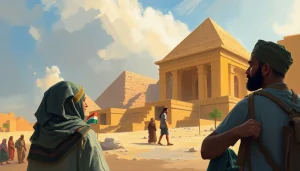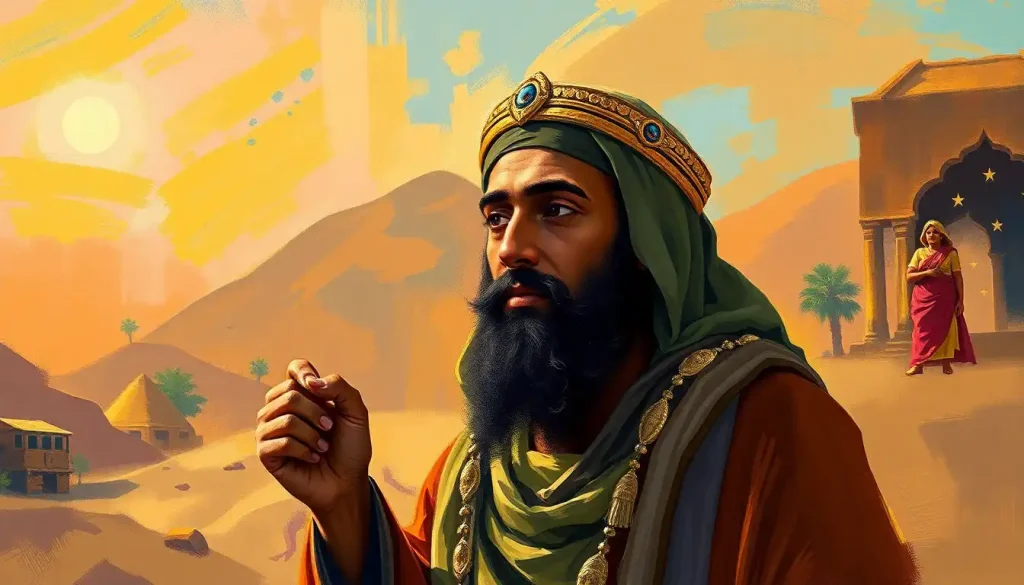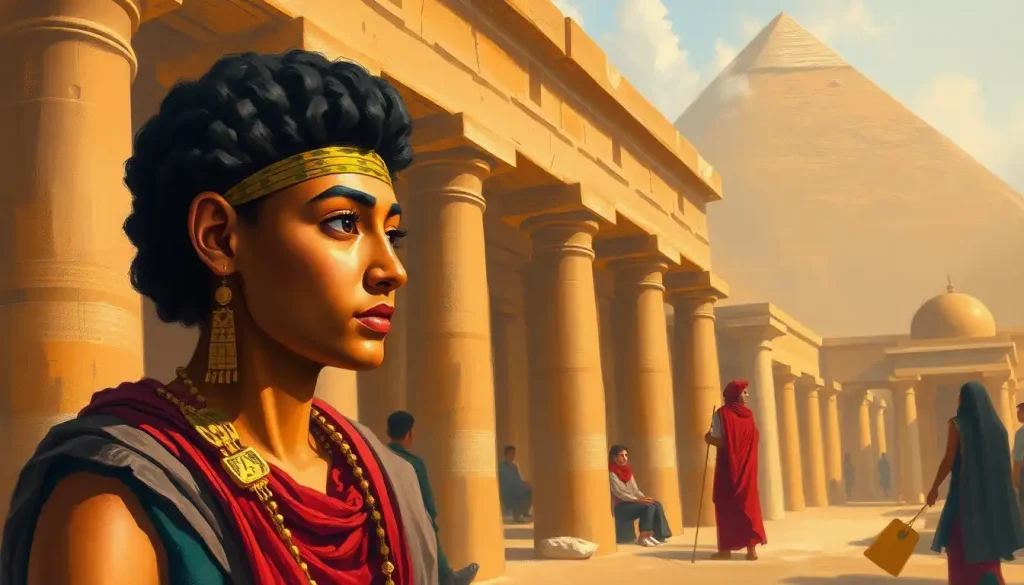From its gleaming ancient pyramids built with vast riches to its modern struggle with inflation and poverty, no nation better illustrates the dramatic extremes of economic fortune than the land of the pharaohs. Egypt’s journey through time is a testament to the ebb and flow of wealth, power, and prosperity. It’s a tale that spans millennia, from the golden age of the pharaohs to the complex economic landscape of today.
The story of Egypt’s wealth is not just a historical curiosity. It’s a powerful lens through which we can examine the forces that shape a nation’s wealth and economic destiny. As we delve into this fascinating narrative, we’ll uncover lessons that resonate far beyond the banks of the Nile, offering insights into the nature of prosperity itself.
Ancient Egypt’s Wealth: A Golden Age of Prosperity
Picture, if you will, a land blessed by nature and human ingenuity. Ancient Egypt was not just wealthy; it was a powerhouse of economic might that left an indelible mark on history. At the heart of this prosperity lay the life-giving waters of the Nile River, a natural highway that nurtured fertile lands along its banks.
The Nile’s annual flood was the lifeblood of Egyptian agriculture, depositing rich silt that transformed the surrounding desert into a verdant oasis. This agricultural abundance was the foundation of Egypt’s wealth, producing surpluses that fueled trade, funded monumental construction projects, and supported a complex society.
But the Egyptians didn’t just rely on what nature provided. They were master traders, establishing vast networks that stretched from Nubia to the Levant and beyond. Their exports were highly prized: papyrus, linen, grain, and gold flowed out of Egypt, while exotic goods like cedar wood, lapis lazuli, and ivory flowed in.
The crowning glory of this wealth was Egypt’s monumental architecture. The pyramids, temples, and tombs that still awe us today were not just displays of power – they were economic engines in their own right, employing thousands and showcasing the nation’s vast resources.
And let’s not forget the glitter of gold. Egypt’s eastern deserts were rich in gold mines, providing the precious metal that adorned pharaohs and temples alike. This abundance of gold played a crucial role in Egypt’s economy and international prestige, cementing its status as a wealthy and powerful nation.
The Tides of Fortune: Egypt’s Economic Decline and Transformation
But as the saying goes, all that glitters is not gold – at least not forever. Egypt’s economic fortunes began to wane with the shifting sands of time and geopolitics. Foreign invasions, starting with the Persians and culminating with Alexander the Great, marked the beginning of a long period of external control over Egypt’s vast resources.
The rise of new trade routes and the discovery of sea passages to India and the Far East dealt a blow to Egypt’s strategic position as a trade hub. The once-bustling ports along the Nile Delta saw their importance diminish as ships bypassed them for new routes around Africa.
Under the Ottoman Empire, Egypt’s economy underwent further transformation. While still agriculturally productive, the country became more of a supplier of raw materials to the empire rather than the economic powerhouse it once was. The introduction of cash crops like cotton changed the agricultural landscape, tying Egypt’s fortunes more closely to global market demands.
The British occupation in the late 19th century brought modernization but also economic exploitation. While infrastructure projects like the Suez Canal boosted Egypt’s strategic importance, much of the wealth generated flowed out of the country, leaving a legacy of economic dependency that would prove challenging to overcome.
Modern Egypt: Navigating Economic Challenges in a Changing World
Fast forward to today, and Egypt’s economic landscape is a complex tapestry of challenges and opportunities. The country’s economy is driven by a mix of sectors, each with its own dynamics and challenges.
Tourism, once a cornerstone of the economy, has faced setbacks due to political instability and global events. Yet, the allure of Egypt’s ancient wonders continues to draw visitors from around the world, offering a glimpse of the potential that lies in this sector.
The Suez Canal, that marvel of 19th-century engineering, remains a crucial source of revenue. Its importance was underscored in 2021 when a single stuck ship caused global trade disruptions, highlighting Egypt’s strategic position in international commerce.
Oil and gas sectors have grown in importance, with new discoveries in the Mediterranean offering promise for the future. However, like many resource-rich nations, Egypt faces the challenge of avoiding the “resource curse” and diversifying its economy.
Yet, for all its potential, modern Egypt grapples with significant economic challenges. High inflation, unemployment, and poverty rates paint a stark contrast to the opulence of its ancient past. Income inequality is a pressing issue, with wealth concentrated in the hands of a few while many struggle to make ends meet.
Foreign investments and international aid play a significant role in Egypt’s economy, but they’re a double-edged sword. While they provide much-needed capital and support, they also create dependencies and can be subject to political whims.
Political instability, particularly in the wake of the Arab Spring, has had a profound impact on Egypt’s economic growth. The delicate balance between stability and reform remains a key challenge for policymakers seeking to unlock Egypt’s economic potential.
Nature’s Bounty: Egypt’s Natural Resources and Potential Wealth
Despite these challenges, Egypt is far from resource-poor. The country sits on significant oil and natural gas reserves, particularly in the Western Desert and the Mediterranean Sea. These resources, if managed sustainably, could provide a foundation for future economic growth.
But perhaps the most exciting potential lies in renewable energy. Egypt’s vast deserts offer ideal conditions for solar energy production, while its coastlines hold promise for wind power. As the world shifts towards cleaner energy sources, Egypt could position itself as a regional leader in renewable energy production.
Agriculture remains a crucial sector, with the Nile Delta still among the most fertile regions in the world. However, water scarcity looms as a significant challenge. The Nile, once the source of Egypt’s ancient wealth, is now at the center of regional tensions over water rights. Managing this precious resource will be crucial for Egypt’s food security and economic stability.
The mining sector, too, holds untapped potential. While gold mining has seen a resurgence, other minerals like phosphates could play a larger role in Egypt’s economic future. Balancing the economic benefits of resource extraction with environmental concerns will be a key challenge moving forward.
Charting a Course: Strategies for Harnessing Egypt’s Wealth Potential
So, how can Egypt navigate these choppy economic waters and chart a course towards prosperity? The answer lies in a combination of reform, innovation, and leveraging its unique assets.
Economic reforms and diversification efforts are already underway. The government has implemented measures to attract foreign investment, streamline bureaucracy, and support small businesses. These efforts aim to create a more dynamic and resilient economy, less dependent on any single sector.
Investing in education and human capital is crucial. Egypt’s young population is both a challenge and an opportunity. By improving education and skills training, Egypt can harness the potential of its youth, driving innovation and economic growth.
Infrastructure development is another key area. From improving transportation networks to expanding digital infrastructure, these investments can lay the groundwork for future economic growth. The ambitious new administrative capital being built east of Cairo is a prime example of Egypt’s efforts to modernize and attract investment.
Tourism, while facing challenges, remains a unique asset. By promoting sustainable tourism practices and diversifying its offerings beyond the traditional historical sites, Egypt can build a more resilient tourism sector that benefits local communities while preserving its cultural heritage.
Perhaps the most delicate balancing act is between tradition and modernization. Egypt’s rich cultural heritage is not just a tourist draw; it’s a source of national identity and pride. Finding ways to leverage this heritage while embracing modernization will be key to creating a uniquely Egyptian path to prosperity.
The Pharaoh’s Legacy: Egypt’s Economic Journey Continues
As we reflect on Egypt’s wealth journey from the time of the pharaohs to the present day, we’re struck by the dramatic swings of fortune. From unparalleled opulence to economic struggles, Egypt’s story is a powerful reminder of the ever-changing nature of wealth and prosperity.
Today’s Egypt faces significant challenges, from managing its natural resources to addressing income inequality and navigating regional politics. Yet, it also stands on the cusp of exciting opportunities. Its strategic location, young population, and untapped potential in sectors like renewable energy offer hope for a brighter economic future.
The role of Egypt’s wealth in shaping its future on the global stage cannot be overstated. As one of Africa’s wealthiest countries, Egypt’s economic trajectory will have ripple effects far beyond its borders. Its success or struggles will influence regional stability, migration patterns, and global trade dynamics.
In many ways, Egypt’s economic journey mirrors that of other nations in the region, from the oil-rich wealth of Kuwait to the complex economic landscape of Iran’s wealth. Yet, Egypt’s unique history and resources set it apart, offering both lessons and opportunities for other developing nations.
As we look to the future, the land of the pharaohs stands at a crossroads. The choices made today will determine whether Egypt can reclaim its place as an economic powerhouse or whether it will continue to grapple with the challenges that have plagued it in recent decades.
One thing is certain: the story of Egypt’s wealth is far from over. Just as the ancient Egyptians built monuments that have endured for millennia, today’s Egyptians are laying the foundations for their economic future. Whether they can build something as lasting and impressive as the pyramids remains to be seen, but the potential is undoubtedly there.
In the end, Egypt’s journey from ancient riches to modern challenges serves as a powerful reminder of the complex factors that shape a nation’s wealth. It’s a story of resource management, innovation, global connections, and human potential. As Egypt continues to write its economic story, the world watches with interest, knowing that the lessons learned here will resonate far beyond the banks of the Nile.
References:
1. Amin, G. (2011). Egypt in the Era of Hosni Mubarak. American University in Cairo Press.
2. Chaichian, M. A. (2014). Empires and Walls: Globalization, Migration, and Colonial Domination. Brill.
3. Goldschmidt Jr, A. (2008). A brief history of Egypt. Infobase Publishing.
4. Ikram, S. (2010). Ancient Egypt: An Introduction. Cambridge University Press.
5. Issawi, C. (1961). Egypt since 1800: A study in lop-sided development. The Journal of Economic History, 21(1), 1-25.
6. Metz, H. C. (1990). Egypt: A country study. Federal Research Division, Library of Congress.
7. Richards, A. (1991). The political economy of dilatory reform: Egypt in the 1980s. World Development, 19(12), 1721-1730.
8. Tignor, R. L. (2010). Egypt: A short history. Princeton University Press.
9. Vatikiotis, P. J. (1991). The history of modern Egypt: from Muhammad Ali to Mubarak. Johns Hopkins University Press.
10. Waterbury, J. (2014). The Egypt of Nasser and Sadat: The political economy of two regimes. Princeton University Press.












Would you like to add any comments? (optional)